Report on Understanding Principles and Practices of Assessment
VerifiedAdded on 2023/01/13
|7
|1413
|94
Report
AI Summary
This report delves into the multifaceted realm of assessment, encompassing its foundational principles and practical applications within the context of higher education. It meticulously examines the legal issues, policies, and procedures that govern assessment practices, emphasizing the critical aspects of health and safety, confidentiality, record-keeping, and the promotion of equal opportunities and diversity. The report further explores the transformative impact of technology on assessment, highlighting the use of video evidence, recording of oral evidence, paperless portfolios, and computer-based testing. A significant portion of the report is dedicated to the crucial elements of equality and diversity in assessment, addressing gender, disability, race, culture, religion, and language considerations. Additionally, the report underscores the value of reflective practice and continuing professional development for assessors, emphasizing the importance of reflection on assessment practices, learning from experiences, maintaining expertise, and staying up-to-date with current trends and methodologies. The report provides a comprehensive overview of the subject matter, supported by relevant references.
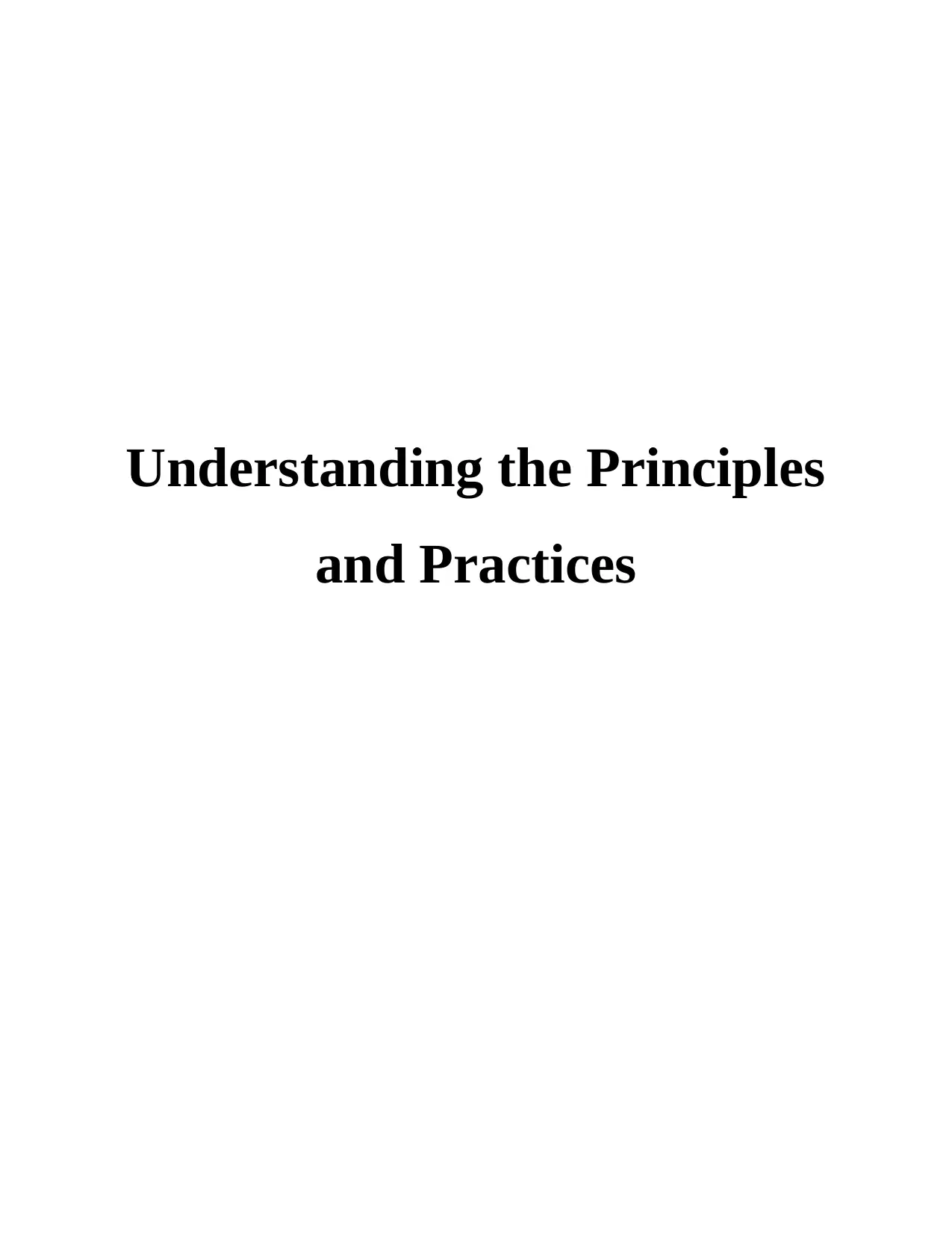
Understanding the Principles
and Practices
and Practices
Paraphrase This Document
Need a fresh take? Get an instant paraphrase of this document with our AI Paraphraser
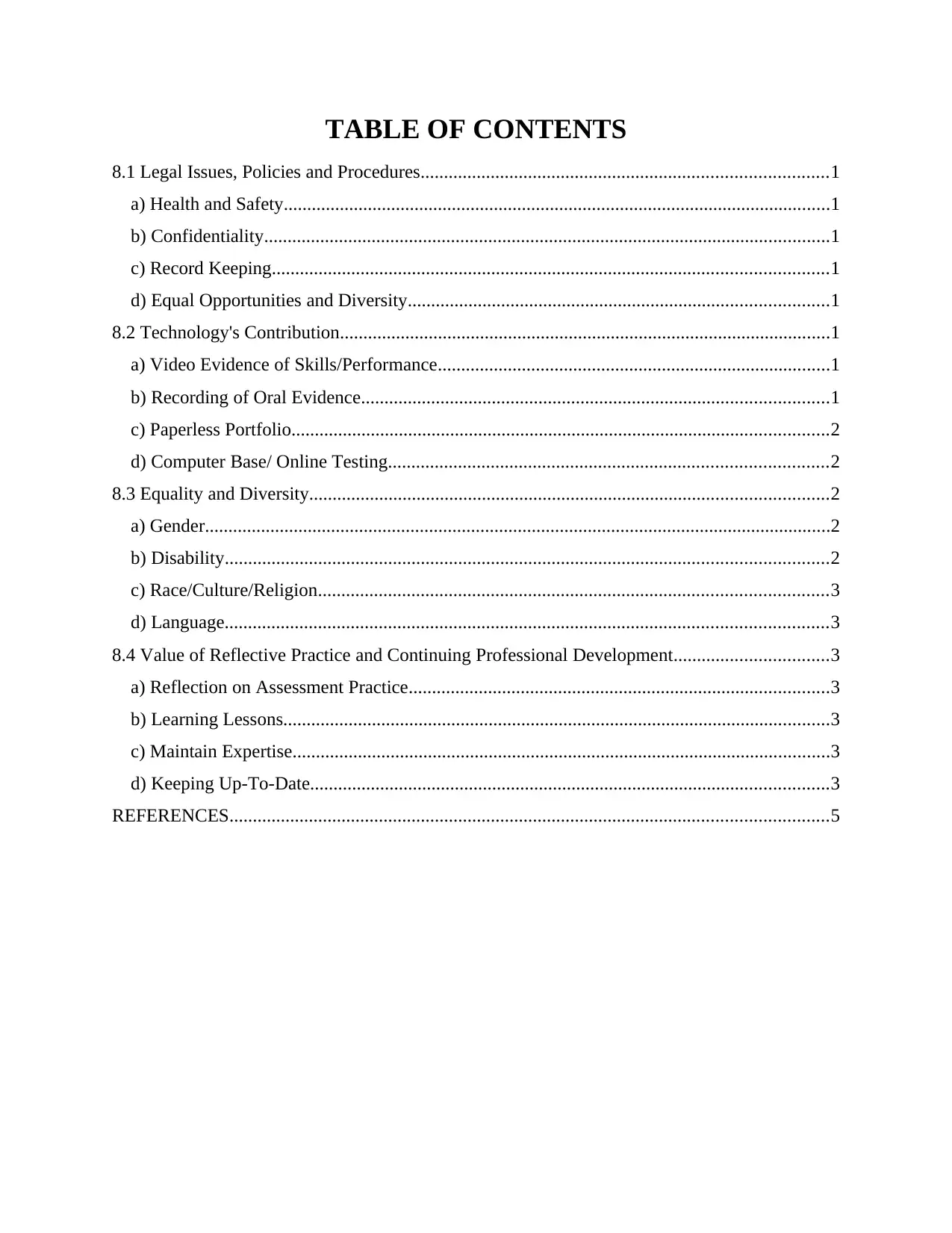
TABLE OF CONTENTS
8.1 Legal Issues, Policies and Procedures.......................................................................................1
a) Health and Safety.....................................................................................................................1
b) Confidentiality.........................................................................................................................1
c) Record Keeping.......................................................................................................................1
d) Equal Opportunities and Diversity..........................................................................................1
8.2 Technology's Contribution.........................................................................................................1
a) Video Evidence of Skills/Performance....................................................................................1
b) Recording of Oral Evidence....................................................................................................1
c) Paperless Portfolio...................................................................................................................2
d) Computer Base/ Online Testing..............................................................................................2
8.3 Equality and Diversity...............................................................................................................2
a) Gender......................................................................................................................................2
b) Disability.................................................................................................................................2
c) Race/Culture/Religion.............................................................................................................3
d) Language.................................................................................................................................3
8.4 Value of Reflective Practice and Continuing Professional Development.................................3
a) Reflection on Assessment Practice..........................................................................................3
b) Learning Lessons.....................................................................................................................3
c) Maintain Expertise...................................................................................................................3
d) Keeping Up-To-Date...............................................................................................................3
REFERENCES................................................................................................................................5
8.1 Legal Issues, Policies and Procedures.......................................................................................1
a) Health and Safety.....................................................................................................................1
b) Confidentiality.........................................................................................................................1
c) Record Keeping.......................................................................................................................1
d) Equal Opportunities and Diversity..........................................................................................1
8.2 Technology's Contribution.........................................................................................................1
a) Video Evidence of Skills/Performance....................................................................................1
b) Recording of Oral Evidence....................................................................................................1
c) Paperless Portfolio...................................................................................................................2
d) Computer Base/ Online Testing..............................................................................................2
8.3 Equality and Diversity...............................................................................................................2
a) Gender......................................................................................................................................2
b) Disability.................................................................................................................................2
c) Race/Culture/Religion.............................................................................................................3
d) Language.................................................................................................................................3
8.4 Value of Reflective Practice and Continuing Professional Development.................................3
a) Reflection on Assessment Practice..........................................................................................3
b) Learning Lessons.....................................................................................................................3
c) Maintain Expertise...................................................................................................................3
d) Keeping Up-To-Date...............................................................................................................3
REFERENCES................................................................................................................................5
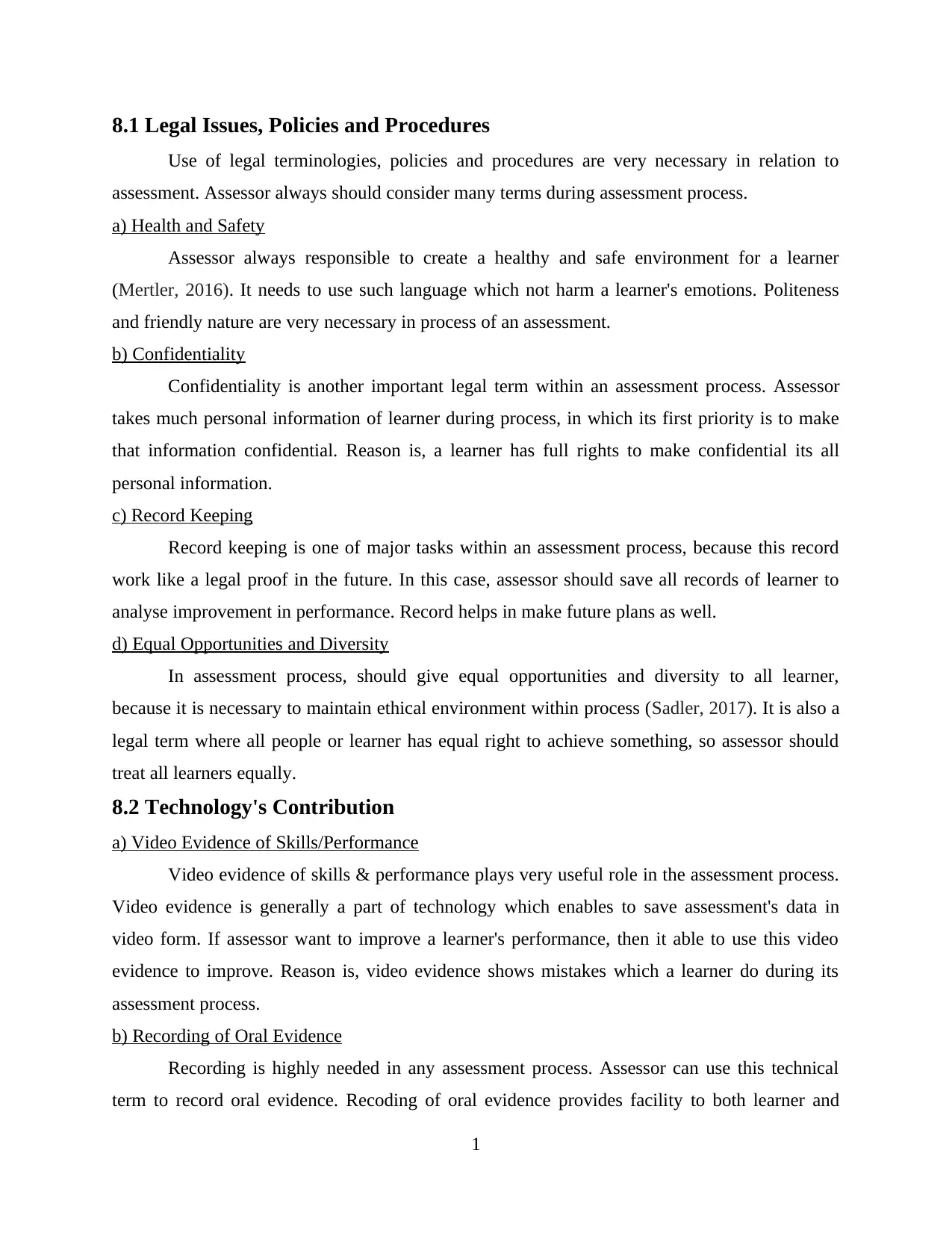
8.1 Legal Issues, Policies and Procedures
Use of legal terminologies, policies and procedures are very necessary in relation to
assessment. Assessor always should consider many terms during assessment process.
a) Health and Safety
Assessor always responsible to create a healthy and safe environment for a learner
(Mertler, 2016). It needs to use such language which not harm a learner's emotions. Politeness
and friendly nature are very necessary in process of an assessment.
b) Confidentiality
Confidentiality is another important legal term within an assessment process. Assessor
takes much personal information of learner during process, in which its first priority is to make
that information confidential. Reason is, a learner has full rights to make confidential its all
personal information.
c) Record Keeping
Record keeping is one of major tasks within an assessment process, because this record
work like a legal proof in the future. In this case, assessor should save all records of learner to
analyse improvement in performance. Record helps in make future plans as well.
d) Equal Opportunities and Diversity
In assessment process, should give equal opportunities and diversity to all learner,
because it is necessary to maintain ethical environment within process (Sadler, 2017). It is also a
legal term where all people or learner has equal right to achieve something, so assessor should
treat all learners equally.
8.2 Technology's Contribution
a) Video Evidence of Skills/Performance
Video evidence of skills & performance plays very useful role in the assessment process.
Video evidence is generally a part of technology which enables to save assessment's data in
video form. If assessor want to improve a learner's performance, then it able to use this video
evidence to improve. Reason is, video evidence shows mistakes which a learner do during its
assessment process.
b) Recording of Oral Evidence
Recording is highly needed in any assessment process. Assessor can use this technical
term to record oral evidence. Recoding of oral evidence provides facility to both learner and
1
Use of legal terminologies, policies and procedures are very necessary in relation to
assessment. Assessor always should consider many terms during assessment process.
a) Health and Safety
Assessor always responsible to create a healthy and safe environment for a learner
(Mertler, 2016). It needs to use such language which not harm a learner's emotions. Politeness
and friendly nature are very necessary in process of an assessment.
b) Confidentiality
Confidentiality is another important legal term within an assessment process. Assessor
takes much personal information of learner during process, in which its first priority is to make
that information confidential. Reason is, a learner has full rights to make confidential its all
personal information.
c) Record Keeping
Record keeping is one of major tasks within an assessment process, because this record
work like a legal proof in the future. In this case, assessor should save all records of learner to
analyse improvement in performance. Record helps in make future plans as well.
d) Equal Opportunities and Diversity
In assessment process, should give equal opportunities and diversity to all learner,
because it is necessary to maintain ethical environment within process (Sadler, 2017). It is also a
legal term where all people or learner has equal right to achieve something, so assessor should
treat all learners equally.
8.2 Technology's Contribution
a) Video Evidence of Skills/Performance
Video evidence of skills & performance plays very useful role in the assessment process.
Video evidence is generally a part of technology which enables to save assessment's data in
video form. If assessor want to improve a learner's performance, then it able to use this video
evidence to improve. Reason is, video evidence shows mistakes which a learner do during its
assessment process.
b) Recording of Oral Evidence
Recording is highly needed in any assessment process. Assessor can use this technical
term to record oral evidence. Recoding of oral evidence provides facility to both learner and
1
⊘ This is a preview!⊘
Do you want full access?
Subscribe today to unlock all pages.

Trusted by 1+ million students worldwide
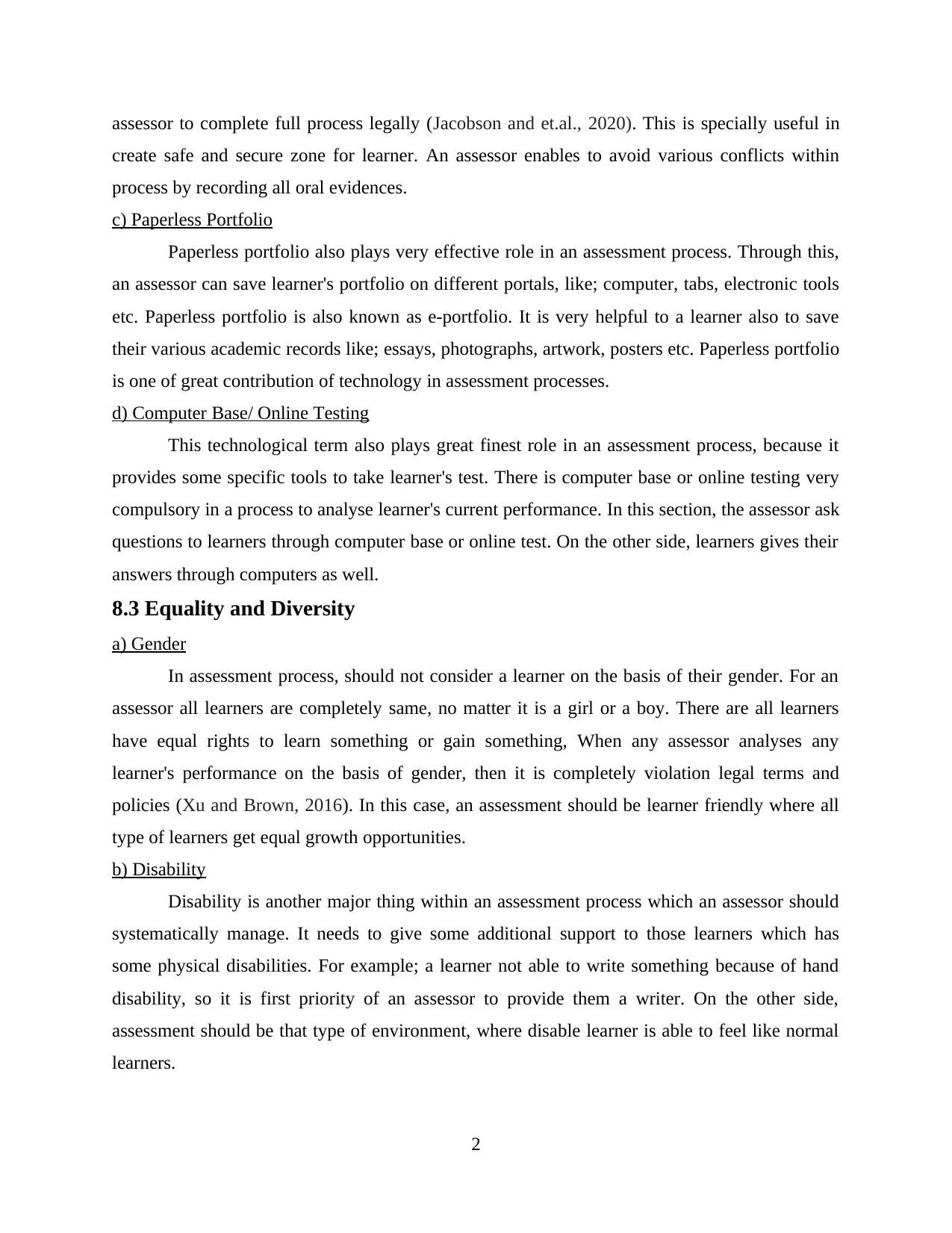
assessor to complete full process legally (Jacobson and et.al., 2020). This is specially useful in
create safe and secure zone for learner. An assessor enables to avoid various conflicts within
process by recording all oral evidences.
c) Paperless Portfolio
Paperless portfolio also plays very effective role in an assessment process. Through this,
an assessor can save learner's portfolio on different portals, like; computer, tabs, electronic tools
etc. Paperless portfolio is also known as e-portfolio. It is very helpful to a learner also to save
their various academic records like; essays, photographs, artwork, posters etc. Paperless portfolio
is one of great contribution of technology in assessment processes.
d) Computer Base/ Online Testing
This technological term also plays great finest role in an assessment process, because it
provides some specific tools to take learner's test. There is computer base or online testing very
compulsory in a process to analyse learner's current performance. In this section, the assessor ask
questions to learners through computer base or online test. On the other side, learners gives their
answers through computers as well.
8.3 Equality and Diversity
a) Gender
In assessment process, should not consider a learner on the basis of their gender. For an
assessor all learners are completely same, no matter it is a girl or a boy. There are all learners
have equal rights to learn something or gain something, When any assessor analyses any
learner's performance on the basis of gender, then it is completely violation legal terms and
policies (Xu and Brown, 2016). In this case, an assessment should be learner friendly where all
type of learners get equal growth opportunities.
b) Disability
Disability is another major thing within an assessment process which an assessor should
systematically manage. It needs to give some additional support to those learners which has
some physical disabilities. For example; a learner not able to write something because of hand
disability, so it is first priority of an assessor to provide them a writer. On the other side,
assessment should be that type of environment, where disable learner is able to feel like normal
learners.
2
create safe and secure zone for learner. An assessor enables to avoid various conflicts within
process by recording all oral evidences.
c) Paperless Portfolio
Paperless portfolio also plays very effective role in an assessment process. Through this,
an assessor can save learner's portfolio on different portals, like; computer, tabs, electronic tools
etc. Paperless portfolio is also known as e-portfolio. It is very helpful to a learner also to save
their various academic records like; essays, photographs, artwork, posters etc. Paperless portfolio
is one of great contribution of technology in assessment processes.
d) Computer Base/ Online Testing
This technological term also plays great finest role in an assessment process, because it
provides some specific tools to take learner's test. There is computer base or online testing very
compulsory in a process to analyse learner's current performance. In this section, the assessor ask
questions to learners through computer base or online test. On the other side, learners gives their
answers through computers as well.
8.3 Equality and Diversity
a) Gender
In assessment process, should not consider a learner on the basis of their gender. For an
assessor all learners are completely same, no matter it is a girl or a boy. There are all learners
have equal rights to learn something or gain something, When any assessor analyses any
learner's performance on the basis of gender, then it is completely violation legal terms and
policies (Xu and Brown, 2016). In this case, an assessment should be learner friendly where all
type of learners get equal growth opportunities.
b) Disability
Disability is another major thing within an assessment process which an assessor should
systematically manage. It needs to give some additional support to those learners which has
some physical disabilities. For example; a learner not able to write something because of hand
disability, so it is first priority of an assessor to provide them a writer. On the other side,
assessment should be that type of environment, where disable learner is able to feel like normal
learners.
2
Paraphrase This Document
Need a fresh take? Get an instant paraphrase of this document with our AI Paraphraser
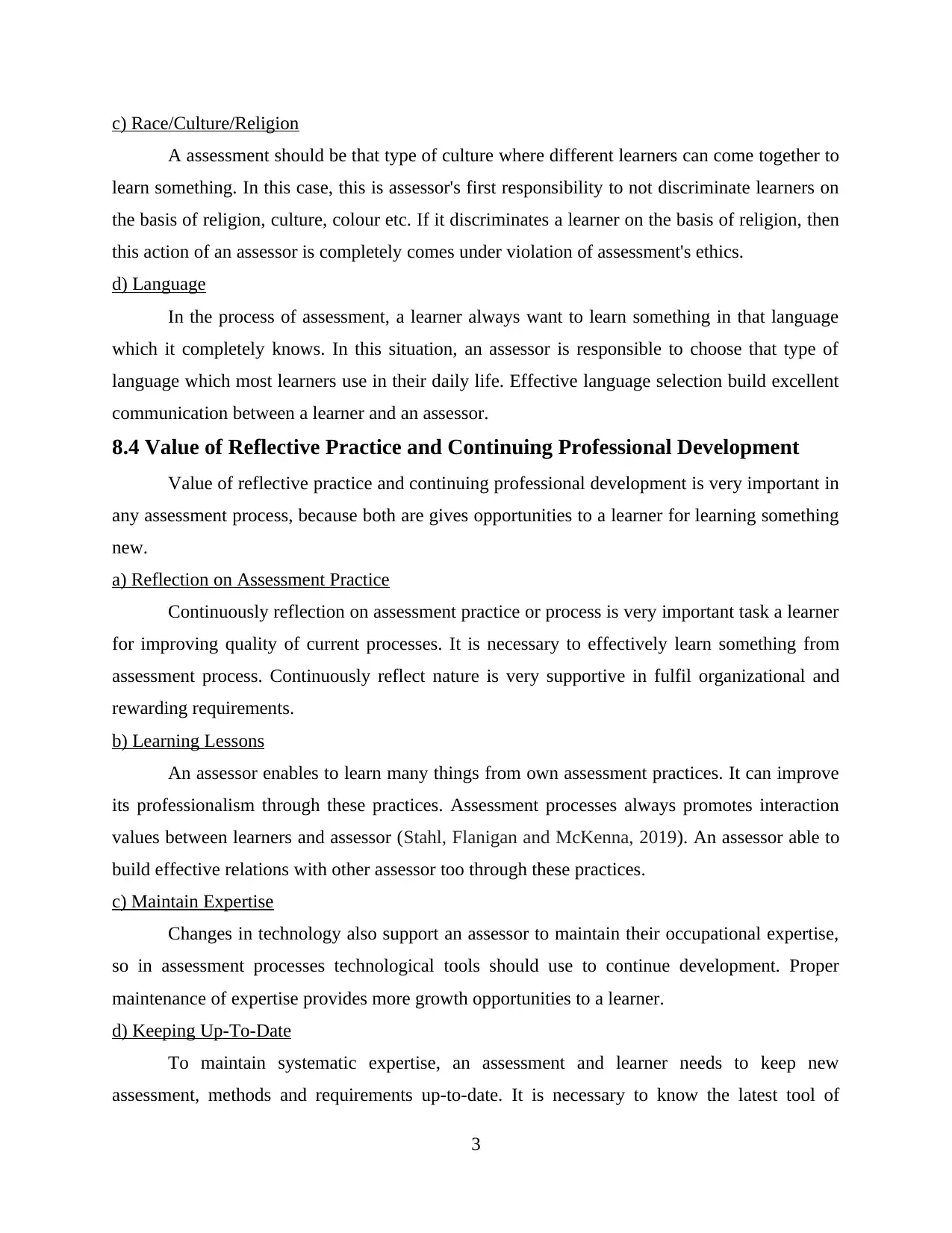
c) Race/Culture/Religion
A assessment should be that type of culture where different learners can come together to
learn something. In this case, this is assessor's first responsibility to not discriminate learners on
the basis of religion, culture, colour etc. If it discriminates a learner on the basis of religion, then
this action of an assessor is completely comes under violation of assessment's ethics.
d) Language
In the process of assessment, a learner always want to learn something in that language
which it completely knows. In this situation, an assessor is responsible to choose that type of
language which most learners use in their daily life. Effective language selection build excellent
communication between a learner and an assessor.
8.4 Value of Reflective Practice and Continuing Professional Development
Value of reflective practice and continuing professional development is very important in
any assessment process, because both are gives opportunities to a learner for learning something
new.
a) Reflection on Assessment Practice
Continuously reflection on assessment practice or process is very important task a learner
for improving quality of current processes. It is necessary to effectively learn something from
assessment process. Continuously reflect nature is very supportive in fulfil organizational and
rewarding requirements.
b) Learning Lessons
An assessor enables to learn many things from own assessment practices. It can improve
its professionalism through these practices. Assessment processes always promotes interaction
values between learners and assessor (Stahl, Flanigan and McKenna, 2019). An assessor able to
build effective relations with other assessor too through these practices.
c) Maintain Expertise
Changes in technology also support an assessor to maintain their occupational expertise,
so in assessment processes technological tools should use to continue development. Proper
maintenance of expertise provides more growth opportunities to a learner.
d) Keeping Up-To-Date
To maintain systematic expertise, an assessment and learner needs to keep new
assessment, methods and requirements up-to-date. It is necessary to know the latest tool of
3
A assessment should be that type of culture where different learners can come together to
learn something. In this case, this is assessor's first responsibility to not discriminate learners on
the basis of religion, culture, colour etc. If it discriminates a learner on the basis of religion, then
this action of an assessor is completely comes under violation of assessment's ethics.
d) Language
In the process of assessment, a learner always want to learn something in that language
which it completely knows. In this situation, an assessor is responsible to choose that type of
language which most learners use in their daily life. Effective language selection build excellent
communication between a learner and an assessor.
8.4 Value of Reflective Practice and Continuing Professional Development
Value of reflective practice and continuing professional development is very important in
any assessment process, because both are gives opportunities to a learner for learning something
new.
a) Reflection on Assessment Practice
Continuously reflection on assessment practice or process is very important task a learner
for improving quality of current processes. It is necessary to effectively learn something from
assessment process. Continuously reflect nature is very supportive in fulfil organizational and
rewarding requirements.
b) Learning Lessons
An assessor enables to learn many things from own assessment practices. It can improve
its professionalism through these practices. Assessment processes always promotes interaction
values between learners and assessor (Stahl, Flanigan and McKenna, 2019). An assessor able to
build effective relations with other assessor too through these practices.
c) Maintain Expertise
Changes in technology also support an assessor to maintain their occupational expertise,
so in assessment processes technological tools should use to continue development. Proper
maintenance of expertise provides more growth opportunities to a learner.
d) Keeping Up-To-Date
To maintain systematic expertise, an assessment and learner needs to keep new
assessment, methods and requirements up-to-date. It is necessary to know the latest tool of
3

learning. These practices are very helpful to achieve effective results from an assessment
process.
4
process.
4
⊘ This is a preview!⊘
Do you want full access?
Subscribe today to unlock all pages.

Trusted by 1+ million students worldwide
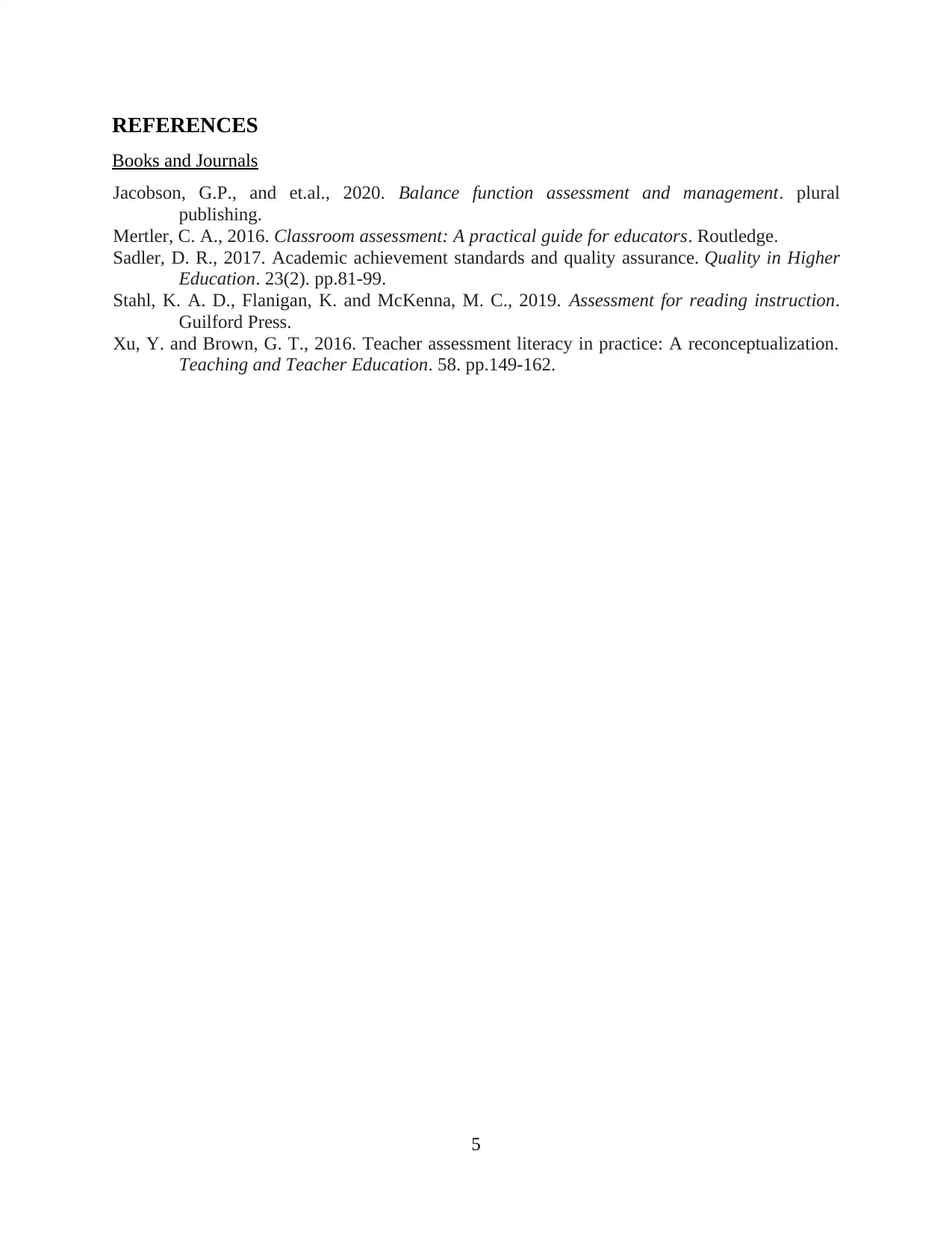
REFERENCES
Books and Journals
Jacobson, G.P., and et.al., 2020. Balance function assessment and management. plural
publishing.
Mertler, C. A., 2016. Classroom assessment: A practical guide for educators. Routledge.
Sadler, D. R., 2017. Academic achievement standards and quality assurance. Quality in Higher
Education. 23(2). pp.81-99.
Stahl, K. A. D., Flanigan, K. and McKenna, M. C., 2019. Assessment for reading instruction.
Guilford Press.
Xu, Y. and Brown, G. T., 2016. Teacher assessment literacy in practice: A reconceptualization.
Teaching and Teacher Education. 58. pp.149-162.
5
Books and Journals
Jacobson, G.P., and et.al., 2020. Balance function assessment and management. plural
publishing.
Mertler, C. A., 2016. Classroom assessment: A practical guide for educators. Routledge.
Sadler, D. R., 2017. Academic achievement standards and quality assurance. Quality in Higher
Education. 23(2). pp.81-99.
Stahl, K. A. D., Flanigan, K. and McKenna, M. C., 2019. Assessment for reading instruction.
Guilford Press.
Xu, Y. and Brown, G. T., 2016. Teacher assessment literacy in practice: A reconceptualization.
Teaching and Teacher Education. 58. pp.149-162.
5
1 out of 7
Related Documents
Your All-in-One AI-Powered Toolkit for Academic Success.
+13062052269
info@desklib.com
Available 24*7 on WhatsApp / Email
![[object Object]](/_next/static/media/star-bottom.7253800d.svg)
Unlock your academic potential
Copyright © 2020–2026 A2Z Services. All Rights Reserved. Developed and managed by ZUCOL.



